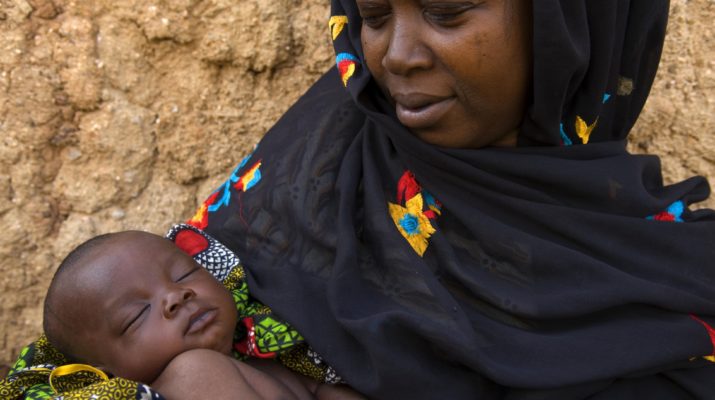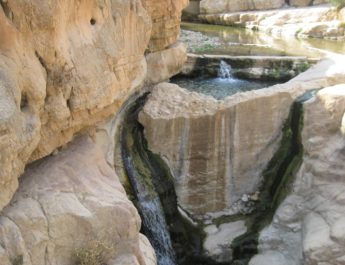Psalm 107:1-7, 33-37
Proper 26A
1 O give thanksA to the Lord,B for he is good,C
A “give thanks” = yadah. From yad (hand). This is to throw one’s hands into the air in a gesture of praise. So, it is to praise, give thanks, or make a confession.
B “Lord” = YHVH. From havah (to be, become) or hayah (to come to pass, become, be). This is the name of the God of Israel, the self-existent and eternal one, the tetragrammaton. This pronunciation has been lost to time so “Lord” is generally used in its place.
C “good” = tob. From tob (to be pleasing, to be good). This is good, beautiful, pleasant, agreeable, bountiful, at ease. This word is used for goodness as a concept, a good thing, a good person. This can refer to prosperity and welfare as well as joy, kindness, sweetness, and graciousness. So, this is ethically good, but also enjoyably good.
for his steadfast loveD endures forever.E
2 Let the redeemedF of the Lord say so,
D “steadfast love” = chesed. From chasad (being good, kind, merciful; may mean bowing one’s neck as is done in the presence of an equal for courtesy’s sake; so, if one in a superior position is treating you like an equal, that is what is captured here). This is favor, goodness, kindness, loving kindness, pity, reproach, or a good deed. When done by God to humanity, this is mercy/loving kindness. When done by humanity to God, it is piety.
E “forever” = olam. This is a long scope of time whether in the past (antiquity, ancient time) or in the future (eternal, everlasting).
F “redeemed” = gaal. This is to redeem someone or something according to kinship laws. So, it could be acting on a relative’s behalf to buy back their property, to marry one’s brother’s widow, etc. This could be more briefly translated as to redeem, acts as kinsman, or purchase. As a noun, it could be deliverer or avenger.
those he redeemed from troubleG
3 and gatheredH in from the lands,I
G “trouble” = yad + tsar. Literally, “from the hand of the enemy.” Yad is hand, ability, power. Hand in a literal sense, but also what one can do or the means by which one does it. Tsar is from tsarar (to bind, restrict, narrow, be cramped, an adversary). Properly, this is a narrow or constricted place. Figuratively, it can be trouble, a pebble, an enemy, anguish, or distress.
H “gathered” = qabats. This is to collect, assemble, heap, grasp, or gather.
I “lands” = erets. Root may mean to be firm. This is earth, ground, field land, or country.
from the eastJ and from the west,K
from the northL and from the south.M
J “east” = mizrach. From zarach (to rise, shine, or dawn; can also describe symptoms of leprosy). This is the east as the place where the sun rises. It can also refer to the sunrise itself.
K “west” = maarab. 14x in OT. From the same as ereb (evening, night, twilight); perhaps from arab (to become dark or become evening). This is the west as the place where the sun sets. It can also refer to the setting itself.
L “north” = tsaphon. From tsaphan (to hide, hoard, reserve; to cover over or figuratively to deny; also to lurk). This is properly hidden, dark, or gloomy. It can also be used to refer to the north.
M “south” = yam. Root may mean to roar. This is the sea, often referring to the Mediterranean. It comes from the root in the sense of the roar of crashing surf. This word is sometimes used for rivers or other sources of water. It can mean to the west or to the south.
4 Some wanderedN in desertO wastes,P
N “wandered” = taah. This is to wander, deceive, seduce, vacillate. It is to stray in a literal or figurative sense.
O “desert” = midbar. From dabar (to speak, command, declare). This is mouth or speech. It can also be desert or wilderness. Additionally, it can be used for a pasture to which one drives cattle.
P “wastes” = yeshimon. 13x in OT. From yasham (to be stripped, destroyed, desolate). This is a wilderness or desert. It can also refer to a place called Jeshimon. It means “wasteland” or “wilderness.” See https://www.abarim-publications.com/Meaning/Jeshimon.html
findingQ no wayR to an inhabitedS town;T
Q “finding” = matsa. This is to find, catch or acquire. It can also mean to come forth or appear. Figuratively, this can mean to meet or be together with.
R “way” = derek. From darak (to tread, march, to walk. Can also mean affixing a string to a box since one needs to step on it to bend it in the process; so also an archer). This is a road as a thing that is walked on. Can be used figuratively for the path that one’s life takes or how one chooses to live one’s life.
S “inhabited” = moshab. From yashab (to sit and so to remain and so to dwell; sitting for any reason – as a judge, in order to ambush, or just sitting quietly; can mean settling or marrying; continue, endure, or establish). This is dwelling, seat, assembly, settlement, population.
T “town” = iyr. From uwr (to awaken or wake oneself up). This can mean excitement in the sense of wakefulness or city. Properly, this is a place that is guarded. Guards kept schedules according to watches. This sense of the word would include cities as well as encampments or posts that were guarded.
5 hungryU andV thirsty,W
their soulX faintedY within them.
U “hungry” = raeb. 16x in OT. From raeb (to be hungry or famished). This is hungry, a person who is hungry.
V {untranslated} = gam. This is also, moreover, again.
W “thirsty” = tsame. 9x in OT. From tsame (to thirst in a literal or figurative sense). This is dry, thirsty, or someone who is thirsty in a literal or figurative sense.
X “soul” = nephesh. Related to naphash (to refresh or be refreshed). This is soul, self, person, emotion. It is a breathing creature. Can also refer to appetites and desires.
Y “fainted” = ataph. 16x in OT. This is to turn, faint, hide, be overwhelmed, cover, fail.
6 Then they criedZ to the LordAA in their trouble,
and he deliveredBB them from their distress;CC
Z “cried” = tsaaq. This is to cry out or call together, to shriek. It can mean, by implication, calling for an assembly.
AA “Lord” = YHVH. Related to “Lord” in v1. From the same as YHVH (see note B above). This is a secondary spelling of the Lord, the name of the God of Israel. It has the same meaning.
BB “delivered” = natsal. This is to snatch someone or something away in a good sense – as rescue, defend, or deliver – or in a bad sense – as strip or plunder.
CC “distress” = metsuqah. 7x in OT. From tsuq (to press on, compress; figuratively, to oppress or bring distress). This is straits or narrowness. Figuratively, it is stress, trouble, or anguish.
7 he ledDD them by a straightEE way,
until they reachedFF an inhabited town.
DD “led” = darak. Related to “way” in v4. See note R above.
EE “straight” = yashar. From yashar (to be straight, right, even, smooth, or agreeable; figuratively, to make something pleasant or prosperous). This is straight, right, level. Also, it is pleasing, whether pleasing God or pleasing other people. So, it is upright or righteous.
FF “reached” = halak. This is go, come, walk. It is walk literally and figuratively and includes people and animals. It can be used figuratively for one’s moral life – how we walk according to God’s way or against it. It can also refer to the walk of life as in the course one’s life takes, the choices we make, etc.
33 He turnsGG riversHH into a desert,
springsII of waterJJ into thirsty ground,KK
GG “turns” = sim. This is to put or place in a literal or figurative sense. It can be appoint, care, change, make, and may other things.
HH “rivers” = nahar. From nahar (to flow, sparkle, be cheerful). This is a stream, river, or flood. Particularly used for the Nile or Euphrates. Figuratively, this can mean prosperity.
II “springs” = motsa. From yatsa (to go or come out, bring forth, appear; to go out in a literal or figurative sense). This is going forth as an act or the site from which something goes forth. It could mean exiting a place or the place where one exits. It can also be a source or a produce. Specifically, it can be a spring or fountain, the dawn as the rising of the sin, an export, gate mine, and so on.
JJ “water” = mayim. This is water, waters, or waterway in a general sense. Figuratively, it can also mean juice, urine, or semen.
KK “thirsty ground” = tsimmaon. Related to “thirsty” in v5. 3x in OT. From tsame (see note W above). This is a place that is thirsty. So, it could refer to a drought or desert.
34 a fruitfulLL land into a salty waste,MM
because of the wickednessNN of its inhabitants.OO
LL “fruitful” = peri. From parah (to bear fruit, grow, be fruitful, increase; bearing fruit in a literal or figurative sense). This is fruit or reward.
MM “salty waste” = melechah. 3x in OT. From the same as melach (powder; used for salt or salt pit); from malach (properly, to pulverize, temper together, dissipate; also to season or salt). This is saltiness or barren land, like a desert.
NN “wickedness” = ra’. From ra’a’ (to be evil, bad, afflict; properly, to spoil – to destroy by breaking into pieces; figuratively, to cause something to be worthless; this is bad in a physical, social, or moral sense; that which displeases, to do harm or mischief, to punish or vex). This is bad, disagreeable, that which causes pain, misery, something having little or no value, something that is ethically bad, wicked, injury, calamity. This refers to anything that is not what it ought to be – a natural disaster, a disfigurement, an injury, a sin.
OO “inhabitants” = yashab. Related to “inhabited” in v4. See note S above.
35 He turns a desert into poolsPP of water,
a parchedQQ land into springs of water.
36 And there he lets the hungry live,RR
and they establishSS a town to live in;TT
PP “pools” = agam. 9x in OT. This is a marsh, pool, pond, or swamp. Its root may refer to an area that holds standing water. It can also refer to reeds as grow in marshes.
QQ “parched” = tsiyyah. 16x in OT. This is dryness or parched. So, it can also mean drought or dry places. By extension, it can mean a solitary place or a wilderness.
RR “lets…live” = yashab. Same as “inhabitants” in v34. See note OO above.
SS “establish” = kun. Properly, this means in a perpendicular position. So, it is set up in a literal sense – establish, fix, fasten, prepare. In a figurative sense, it is certainty, to be firm, faithfulness, render sure or prosperous.
TT “live in” = moshab. Same as “inhabited” in v4. See note S above.
37 they sowUU fieldsVV and plantWW vineyardsXX
and getYY a fruitfulZZ yield.AAA
UU “sow” = zara. This is to sow or scatter seed, conceive or yield. It can also refer to a sower. Figuratively, this can refer to other forms of dissemination.
VV “fields” = sadeh. This is literally field, ground, soil, or land. It can be used to mean wild like a wild animal.
WW “plant” = nata. To fix or fasten, establish or plant. This is planting in a literal or figurative sense.
XX “vineyards” = kerem. This is a vineyard, garden, vines, or a vintage.
YY “get” = asah. This is to make, do, act, appoint, become in many senses.
ZZ “fruitful” = tebuah. From bo (to come in, go in, enter). This is produce, increase or gain – can be literal or figurative.
AAA “yield” = peri. Same as “fruitful” in v34. See note LL above.
Image credit: “Woman Holds a Child” by Arne Hoel of the World Bank, 2012.




